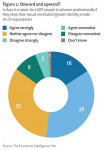Large disparities in business opportunities across China, saysEconomist Intelligence Unit
China is not one market. Regional variations in economic conditions, business regulations and environmental challenges are vast and businesses hoping to prosper in the world's largest emerging economy need to take these differences into account when implementing their strategy. That is the key message arising from the Economist Intelligence Unit's China Regional Forecasting Service, a new business information service which is being launched today.
As the world's attention turns to Beijing and the Olympic Games, the China Regional Forecasting Service uncovers the wide range of opportunities and risks to foreign investment and operations across China's provinces and prefectures. Through its detailed economic forecasts of each province in China, its concise write-up of the latest regional trends in political and economic issues and it's city level assessment of business operating conditions, the service will make it easier for clients to understand this complex market.
The service ranks China's top 44 cities in terms of their key business attributes. The cities currently ranking highest for each category are:
Best economic environment: Shenzhen
Best market opportunities: Shenzhen
Best infrastructure: Guangzhou
Best labour market: Beijing
Best environment: Haikou
The assessment of China's 31 provinces and provincial-level cities also reveals some stark contrasts. Three provincial economies Guangdong, Shandong and Jiangsu are so large as to feature among Asia's top ten economies. China's export powerhouse and richest province, Guangdong, has a population of around 95m and a GDP of US$404bn. The least crowded and most remote, Tibet, has 2.8m inhabitants and a GDP of less than US$5bn. China has ten provinces where income exceeds US$3,000 per head, a level which allows significant spending on consumer products. But it also has areas that are economically on a par with Laos, one of the world's poorest countries.
The new service has a substantial forward looking component, designed to help firms plan ahead as the Chinese economy develops. Comprehensive forecasts are produced using an economic model, produced by the Economist Intelligence Unit in collaboration with Manchester Economic Forecasting, which works with the European Centre for Management Education at the Manchester Business School. The models not only generate forecasts, but also allow the Economist Intelligence Unit to run simulations, answering "what if?" questions and tracing the likely impact of events, such as exchange rate changes, on individual provinces.
Economic analysis of China has long been complicated by worries over the accuracy of its economic statistics. A large country, undergoing rapid change, requires greater attention to data collection and verification than normal. In order to ensure that the Economist Intelligence Unit's forecasts are based on the best possible information, the Beijing based forecasting team has established a deep relationship with the National Bureau of Statistics. This allows for constant dialogue between the forecasting team and China's official statistical agency, and has resulted in much sharing of experience and expertise. As a result, considerable work has been undertaken to enhance the quality of the provincial data and to generate data where information was previously unavailable.
Over the next few decades, China will increasingly become a patchwork of distinct markets each with very different economic structures, market opportunities, policymaking track-records and investment priorities. As these regional disparities sharpen, business strategy will have to evolve accordingly. The new service provides organisations with a means of benchmarking China's regions in terms of current and future economic growth, size and quality of the labour market, local political and legal issues, environment and infrastructure.
Robin Bew, Editorial Director, commented: "We are very proud to be launching this ground breaking service on the Chinese economy. Not only will our provincial and city level assessments help businesses operate more effectively across the country, but our modelling and forecasting work, combined with the data collection efforts of the National Bureau of Statistics, has helped to deepen everyone's understanding of this exciting market."
China Regional Forecasting Service is available to purchase on an annual subscription basis. To request more information, go to www.eiu.com/China.
About the Economist Intelligence Unit
The Economist Intelligence Unit is the business information arm of The Economist Group, publisher of The Economist. Through our global network of about 650 analysts, we continuously assess and forecast political, economic and business conditions in 200 countries. As the world's leading provider of country intelligence, we help executives make better business decisions by providing timely, reliable and impartial analysis on worldwide market trends and business strategies.
웹사이트: http://www.eiu.com
연락처
Joanne McKenna
Press Liaison
Economist Intelligence Unit
26 Red Lion Square
London
WC1R 4HQ
UK
Direct: +44 (0) 20 7576 8188
Sales: +44 (0) 20 7576 8181
Switchboard: +44 (0) 20 7576 8000
email: 이메일 보내기
이 보도자료는 Economist Intelligence Unit가(이) 작성해 뉴스와이어 서비스를 통해 배포한 뉴스입니다.




